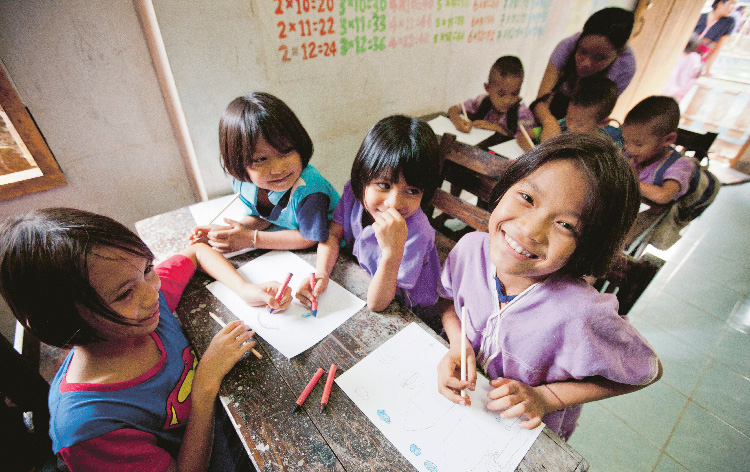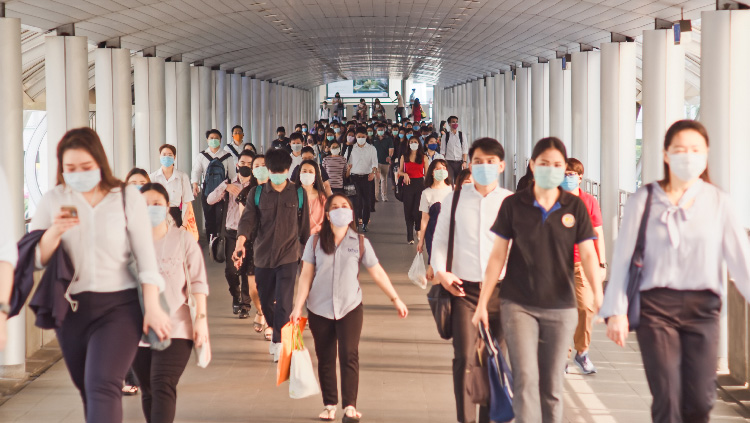The coronavirus disease (COVID-19) crisis spawned a “pandemic of inequality” in Asia and the Pacific, pushing 85 million people into extreme poverty. Developing countries must ensure that economic recovery will be inclusive and benefit the most vulnerable, said a new report from the United Nations Economic and Social Commission for Asia and the Pacific (UNESCAP).
According to UNESCAP’s Economic and Social Survey of Asia and the Pacific 2022, the pandemic has adversely affected 829 million informal workers and increased the number of people living on less than $1.90 a day as a result of widespread lockdowns that paused economic activity across the region.
To meet the Sustainable Development Goals (SDGs) by 2030 and ensure vulnerable groups will not suffer long-term “scarring,” governments need to “build forward fairer” as they try to revive their economies, it said.
According to the report, women were disproportionately affected. It cited a report from the International Labour Organization that found the pandemic led to a decrease of 3.8% in employment among women compared with 2.9% for men.
The report sees the region’s growth moderating to 4.5% in 2022 from 7.1% in 2021, citing renewed lockdowns and restrictions following the emergence of COVID-19 variants. Growth is forecast at 5% in 2023. It warned of global headwinds further threatening growth, including the possible emergence of new variants and the ongoing geopolitical conflict.
The uneven recovery among different sectors represents a major challenge for inclusive recovery and development, and is likely to further impede progress in meeting the SDGs. The report “makes a strong case that now is the time for more investment and spending, not less,” said United Nations Secretary-General António Guterres in the foreword.
UNESCAP recommended a three-pronged policy agenda for the region:
Invest in education, health care, and social protection
Although developing countries are facing tight budgets after rolling out massive stimulus spending to fight the pandemic, they must funnel resources into basic universal health coverage, push for universal primary and secondary education, and expand social protection coverage.
The report cautioned governments against reducing spending on such programs. Governments typically axe spending on health care, education, and social spending during times of fiscal consolidation. This is already happening in education spending. Two thirds of low- and lower-middle- income countries have already cut their public education budgets since the onset of the pandemic.

In health care, meanwhile, per capita government health spending would need to rise by approximately 5–10 percentage points from 2019 levels to be able to return to pre-COVID-19 growth rates.
Social protection in the Asia–Pacific region is below the global average. Coverage varies significantly across socioeconomic groups, indicating the region is a still long way toward achieving universal social protection.
Governments should “spend smart” by ensuring that basic health care services become increasingly universal, that all children receive high-quality education, especially girls and those in rural areas, and that social protection measures shield all throughout their life, in particular marginalized and vulnerable groups.
The report also urged countries to enhance the efficiency of tax collection through reforms, such as a more progressive income tax, and by digitalization and taxing the digital economy.
Mobilize central banks to contribute to inclusive development
Central banks have a role to play in inclusive development. Currently, only half of central banks in the region have taken up inclusive finance concerns, which is a “missed opportunity,” the report said, noting that financial access, financial education, and consumer protection benefit the poor relatively more than those better off.
One of the ways central banks can do this is by investing official reserves in social bonds or as seed capital for social projects. The region’s central banks invest the bulk of the estimated $9.1 trillion reserves in bank deposits and money market instruments, which offer no clear or direct social benefits. On the other hand, social impact bonds and sustainability-linked bonds enhance the effectiveness of development spending and attract more diverse bond issuers. Since social bonds are in their infancy stage in the region, central banks and other financial supervisory authorities can conduct knowledge campaigns and provide financial assistance partially to cover high project transaction costs.
Monetary officials may also explore how a central bank digital currency can enhance financial access and encourage more innovative financial instruments for social purposes. Already, half of the central banks in the region are exploring how a digital currency could help improve financial inclusion. However, the report cautioned central banks to carefully consider operational issues, such as legal frameworks and risk mitigation, as well as potential challenges like availability of internet infrastructure and citizens’ digital literacy.
Prevent inequality from taking root through structural transformation
To address inequalities and build forward fairer, developing countries need to aim for a more equal distribution of economic power and economic opportunities. This entails favoring labor-intensive manufacturing as the fast creation of regular and productive jobs prevents inequality from taking root. The report cited the case of Bangladesh and Viet Nam, where labor-intensive manufacturing has supported inclusive structural transformation. It cautioned against shifting to service-based economies as this may lead to greater inequality pressures even with economic growth.

Empowering workers by eliminating labor market obstacles that restrict equal access to jobs and providing them with the necessary skills to explore job market opportunities can also spur inclusive development.
The report also prescribed a balanced approach when it comes to embracing both manufacturing and technology advances like artificial intelligence and robotics, because of their potential to displace workers in vulnerable occupations, thus, worsening inequality.
This article was first published on 07 May 2022 in our Weekly Epaper issue 192 |
THE BRUNEIAN | BANDAR SERI BEGAWAN



